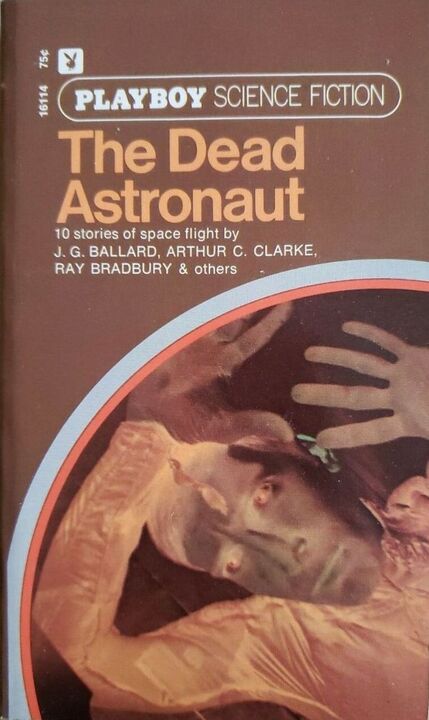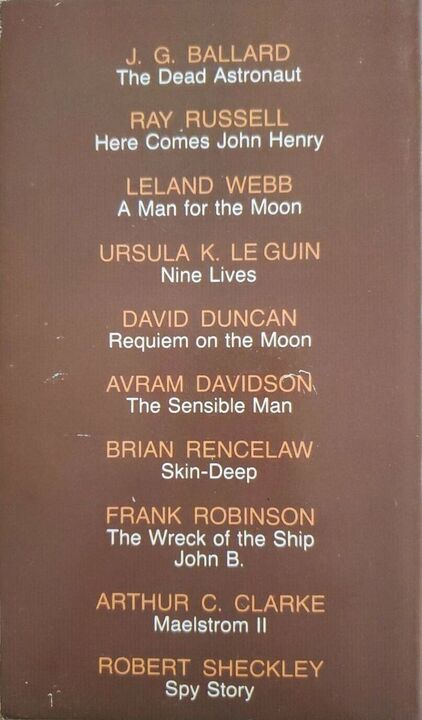Stories of Isolation and Lonely Death: The Dead Astronaut by Playboy Science Fiction
 |
 |
The Dead Astronaut (Playboy Press, 1971). Cover by Pompeo Posar
Last summer I came across an intriguing aside on the SF anthology The Dead Astronaut by Playboy Press (1971). I can’t remember the name of the blogger who had re-cracked it, but the person noted that with everyone locked down and socially distanced, these decades-old stories of isolation and lonely death, mostly written between Sputnik and the Apollo landing, felt newly relevant. I agree.
While I admit I don’t have the knowledge base of some of the vintage SF reviewers here, I did like the stories enough highlight the collection and offer a quick review in case others wanted to experience the unintentional “prophetic” element of science fiction, as the editorial introduction labels it.
The collection’s introduction is signed simply “The Editors” but according to The Science Fiction Encyclopedia Ray Russell (1924-1999) edited it, offering a tidbit about each author and a story note or two in his brief introduction.
“The Dead Astronaut” by J.G. Ballard
The eponymous tale of the collection is one-hundred percent earthbound, telling the story of a husband and wife experiencing the long-awaited return of a capsule containing a dead American astronaut. The wife in the story is the returning corpse’s widow and the husband was formerly a co-worker of both at the Kennedy Space Center. Their dead astronaut has been up there fifteen years or so and is due to automatically crash-land in the next couple days, and his widow has become increasingly obsessed with his return.
But there have been changes in U.S. space policy, and Pebble Beach and the Space Center are now more or less a toxic Chernobyl Exclusion Zone of overgrown launch gantries and abandoned facilities. Just like Chernobyl, relic hunters prowl the grounds in hope of finding NASA souvenirs. Our protagonists want to make sure this particular astronaut is recovered and buried rather than turned into a oddity to be sold off by a treasure hunter. The dead astronaut comes in hot and things take a turn for the worse . . .
“Here Comes John Henry” by Ray Russell
This is the most dramatic story of the collection, weaving together both racial issues — the narrator is a black astronaut — and the Cold War chronicling the first joint US/Soviet moon landing mission. I give it high marks for ability to shock, but the whole premise of the story requires one too many miracles for me. The story posits both an extreme rivalry between the Cold War antagonists in space and at the same time death-grip cooperation in screwing over their famous astronaut/cosmonaut pair, as though before the famous Apollo-Soyuz linkup everyone had been given weapons and a blessing for the odds to ever be in their favor. But if you can get over the premise, it’s fine.
“A Man for the Moon” by Leland Webb
Another Earthbound story, this one involving a U.S. Navy pilot in the spaceflight program. I really enjoyed Webb’s writing, his dialog is first class and he can pack a lot of life into a single paragraph. The story itself isn’t much, just that of an astronaut contemplating the first trip to the moon, his mortality, and the implications of his being selected over the men who were training with him, but I liked his ability to craft prose enough that I want to read more work of his.
“Nine Lives” by Ursula K. Le Guin
A stronger story in the collection, Le Guin manages to tell three stories each with its own set of ideas together in the tale of a pair of remote-planet surveyors who have a family (you might call them) of clones arrive to exploit a dangerous, geologically unstable world’s resources. Le Guin knits together ideas and incident without even breaking a sweat.
For example, this scene where one of the surveyors, a scientist named Owen Pugh, wakes up that first morning after the ship’s arrival among the sleek, well-formed young clones, gives you a lot to chew on in a single paragraph:
“It’s a pleasure,” Pugh said, half truthfully. He had to stand up then, wearing only the shorts he slept in, and he felt like a plucked rooster, all white scrawn and pimples. The United Kingdom had come through the Great Famines rather well, losing less than half its population, a record achieved by rigorous food control. Black-marketers and hoarders had been executed. Crumbs had been shared. Where in richer lands many had died and few had thrived, in Britain fewer died and none throve. They all got lean. Their sons were lean, their grandsons lean, small, brittle-boned, easily infected. They had replaced survival of the fittest with survival of the fairest. Owen Pugh was a scrawny little man. But he was there.
“Requiem on the Moon” by David Duncan
This story surprised me, as it appeared to be going in one direction, a Twilight Zone plodder of an astronaut on the dark side of the moon who is left alone with the corpse of his comrade after a tragic accident going mad from loneliness. It took an interesting turn into something hopeful, even triumphant. If only everyone’s pandemic could have a conclusion like this!
“The Sensible Man” by Avram Davidson and “Skin Deep“ by Brian Rencelaw
I put these two stories together because they are both very brief and have a similar tone, straight out of E.C. Comics. Terrible people do dreadful things and receive, in return, ironic justice. I can see why Russell put them next to each other.
“The Wreck of the Ship John B.“ by Frank Robinson
This is the longest story, novella length. I suspect this one will feel familiar to those stuck through the pandemic with their families. The tale involves a group of colonists on a very long space voyage with nothing to do, as the ship has been more-or-less idiot-proofed. There’s the rub, because they soon realize that their make-work tasks are just that, and they begin to subside into routine and torpor until they find a derelict colony-ship leaking a trail of bodies. The ship’s nominal captain explores the empty derelict, reads the future in the disaster, and has to resort to some tough love to pull his crew together. This is one of those “people need a challenge or they wither” stories that every sf great did at least once in their career, but it’s been long enough since I read one that I enjoyed it. It made me grateful for the challenges of the early pandemic months, when toilet paper and hand sanitizer were unobtanium and workarounds had to be put into place.
“Maelstrom II” by Arthur C. Clarke
In an update of Poe’s classic, Clarke tells a story of an astronaut in a decaying moon orbit facing the knowledge of the exact time and manner of his death. It’s about as hard as hard SF gets. As he’s saying goodbye to his wife and children, Mission Control comes up with a possible solution that requires a literal leap of faith. This story, with physics as a grim killer more relentless than Giger’s xenomorph, shows why Clarke’s name is known by most cultural literates.
Spy Story by Robert Sheckley
While the anthology isn’t as grim as you might think, Russell decided to leave ’em laughing with this sf-by-way-of-Monty Python capstone. A technically-minded space ship hot-rodder lives relatively happily in a future US surveillance state that makes East Germany seem like Erewhon. He decides to seek freedom from blundering minders and noisy cameras and recording machines among the stars. But of course the Creep State can’t resist coming along for the ride . . .
And that does it. I was impressed enough that I blind-bought the three other Playboy sf anthologies I could find: Transit to Earth, From the S File, and Last Train to Limbo. And if you’re scratching your haven’t-had-a-pro-haircut-in-a-year head saying “wait a second, the cover graphic says Bradbury and there’s no Bradbury in your summary” you’re a lot faster on the mental draw than I. For reasons known only to the Ray Russell, this volume’s dead astronaut, there is no Bradbury despite his name being on the cover. Dead sf anthologists tell no non-backlist tales.
E.E. Knight is the author of the Vampire Earth, Age of Fire, and Dragoneer Academy novels. He lives just outside Chicago with his family.
You should check out what Joachim Boaz has been doing at SF Ruminations (https://sciencefictionruminations.com/). One of his projects (he has many!) is a series of reviews of stories critical of the space program (more or less), which was, as I recall, inspired by Ballard’s “The Dead Astronaut”.
Indeed, we should all check out all the other things Joachim is doing at his site — a bunch of fascinating reviews of a wide variety of material.
Thank you for the shoutout Rich — and all the great discussion points you’ve brought up.
Ballard and Malzberg were the two authors whose work convinced me to start the series. And, weirdly, Harvey Jacobs’ very naughty “Gravity” (1969)
Great review!
I’m pretty sure I’m the blogger in question who “re-cracked it” — here’s my June 2020 review.
https://sciencefictionruminations.com/2020/06/16/book-review-the-dead-astronaut-ed-uncredited-1971-j-g-ballard-ursula-k-le-guin-arthur-c-clarke-et-al/
Yes, you were, thank you J. B.!! I’m going to work my way through the rest of the Playboy SF next!
For me, looking over my review and the discussion in the comment section, “The Wreck of the Ship John B.“ by Frank Robinson was the surprise of the collection. I’m a sucker for complex metaphors of urban alienation — Robinson does spell it out a bit in the story and resort to an ending that diminishes the psychological trauma of the experience.
Yeah the end made it seem like a return to Earth. They hit the bar with some babes to get wings or whatever. I think a little bit more could have been done with the kind of people that sign up for colony relocation where they lose 30-40 percent of the outbound ships or whatever the figure was. But in my old age I’m turning into a giant softie who just wants to talk about the good bits.
I’m still a bit of an eviscerator although the historian in me often finds the context of the story and the world it was produced in fascinating — and thus the story adds to that knowledge.
I’d love to hear your thoughts on my own review.
I am currently conducing a multi-post series on negative/subversive accounts of space travel. The Ballard story in this collection (and my interest in Malzberg) spurred the series.
*conducting
Surely the Bradbury story Russell meant to have in the book but didn’t would have been “Kaleidoscope”.
Your description of Ballard’s eponymous story that opens this anthology caused the short hair on my forearms to prickle; very creepy indeed! Nicely done. That plot summation alone caused me to search out the book on Amazon.com. Overall, this sounds like a fascinating collection of short stories by some of the genre’s best. (And I do wonder about that missing Bradbury story! But then, I’ll go to my grave wondering what mental block/time constraints/legal reasons/other stopped Harlan Ellison from releasing The Last Dangerous Visions. . . .)
Well Carl as I said above in my sere and yellow leaf I tend to only talk about the good in each story. But the clinkers were mercifully brief and there are worse ways to spend an afternoon. It is worth it if you can find a used one for a couple bucks.
wow, i was really interested in this because of the review! only 2 copies on abe books and neither seem like where i want to buy from… man, way to peak interest :p
i wish all these old collections could be re-issued digitally or something.
There are a few available on Amazon.